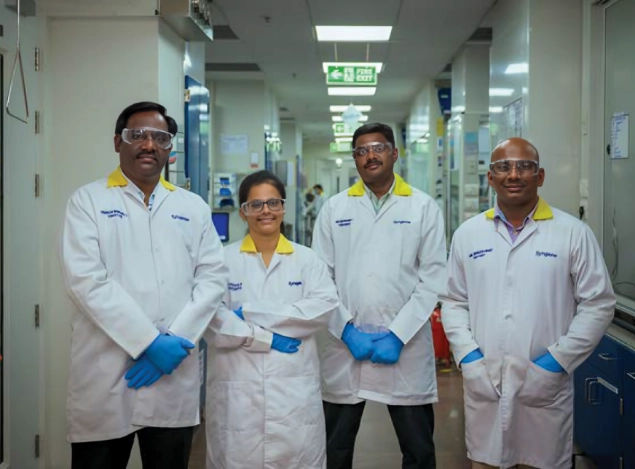

Licochalcone A, a potent flavonoid derived from the roots of Glycyrrhiza (a small perennial herb), is well-known for its therapeutic properties, such as anti-inflammatory and antiviral effects, particularly against viral neuraminidase (1). This plant is endangered and close to extinction (2), Syngene along with a client is helping in the restoration of this plant, by conducting chemical synthesis in the lab. Extracting multi-tons of compounds from plants is commercially infeasible due to the substantial volume of solvents required for product extraction, which also makes it environment unfriendly. Additionally, in plants, bioactive compounds exist in low quantities (nanogram to picogram), preventing the pharmaceutical industry from using them in bulk.
Recognizing Syngene’s expertise in synthetic chemistry, a prominent personal care brand specializing in skin and body care approached us to synthetically produce Licochalcone A for incorporation into their skincare products. Syngene’s chemical development unit played a crucial role in enabling the production of natural compounds in substantial quantities (milligram-kilogram) in the laboratory.
Initially, the client engaged a contract research organization (CRO) for the synthesis of the compound but encountered a low yield of 1.6% under harsh process conditions. Subsequently, Syngene was approached to optimize the process and establish a scalable and gentle synthesis method. The task was to prepare a 100g proof-of-concept (PoC) sample.
The synthesis process included five steps. The overall yield significantly improved from the initial yield of 1.6% to 9% using the optimized Syngene process. Yield improvements were observed in each synthesis step with no loss of purity (similar to client purity) in all five steps. Step 4 showed a double yield as compared to the client process.
The scientists eliminated the use of column chromatography in the process, which consumed significant amounts of solvents. In addition, the Claisen rearrangement reaction was performed at lower temperatures (120-130°C), avoiding the use of sealed tube conditions (180-200°C) and autoclave (>120-150°C), making the entire process more environmentally friendly.
Proof of Concept deliveryUtilizing the modified process, Syngene successfully shipped a PoC sample of 100g to the client.
Scalability demonstratedSyngene achieved and demonstrated a scalable synthesis process, extending up to a kilogram scale.
Improved yieldThe improved yields resulted in higher productivity and made the process more efficient.
Sustainable processThe process at Syngene will reduce impact on the planet due to diminished solvent consumption in the process and less energy consumed by equipment.
Cost savingsThe modified process utilized less expensive solvents and chemicals (methanol and sodium hydroxide) which improved the cost of goods. Also, a significant reduction of more than 50% was achieved in the cost of 100 Kg manufacturing of the flavonoid. The process is capable of 50% reduction in cost of manufacturing as compared to the process which was provided by client.
(1) Traditional Uses, Bioactive Chemical Constituents, and Pharmacological and Toxicological Activities of Glycyrrhiza glabra L. (Fabaceae)
(2) Perspectives of Licorice Production in Harsh Environments of the Aral Sea Regions